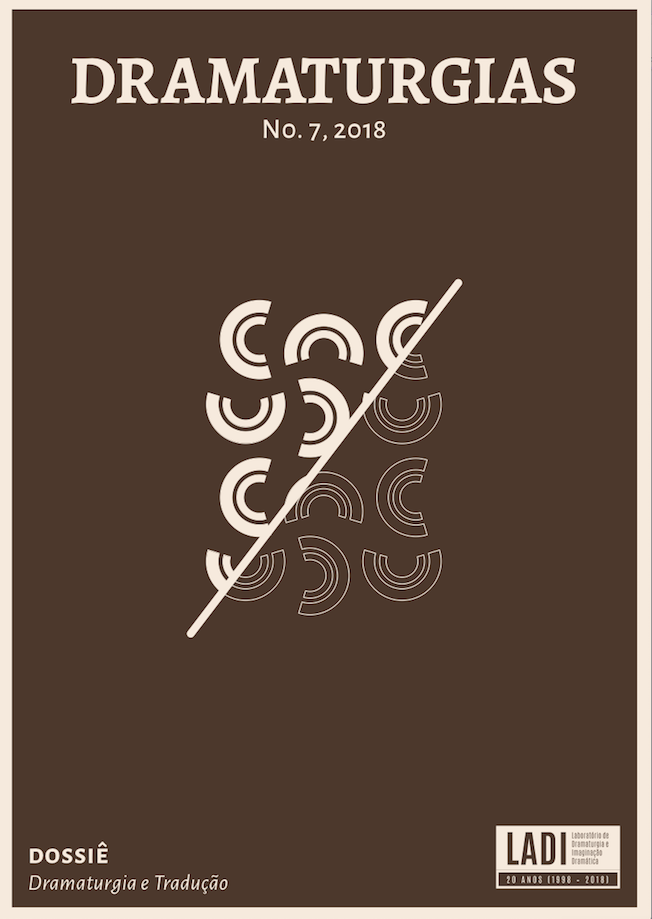Burning Socrates’ School down with Aristophanes: Learning and teaching under Clouds
DOI:
https://doi.org/10.26512/dramaturgias.v0i7.9534Palavras-chave:
Aristófanes, Filosofia da Educação, Sócrates, Dramaturgia, Teoria da Educação, Terminologia de Ensino e Aprendizagem, Comédia.Resumo
Em As Nuvens de Aristófanes, Sócrates irrompe como um sofista proprietário de um estabelecimento de ensino, o Frontistério ( Pensatório), onde ele recebe estudantes de todas as idades, com o objetivo de ensinar a eles não apenas filosofia, literatura e física, mas também técnicas sofísticas efetivas. Em As Nuvens, ideias opostas podem ser encontradas como as metas do método educacional do Sócrates histórico combinadas com as dos modernos sofistas. Aristófanes, valendo-se de técnicas educacionais específicas,
enfatiza constrastes e discordâncias ( Causa Justa X Causa Injusta), e sublinha a distância ente o discurso teórico vazio de jovens intelectuais e as necessidades práticas reais na educação (habilidades interpretativas, ajustes práticos, etc.). Nesta comédia, Aristófanes lida com diversos temas educacionais, os quais são encontrados em diversas culturas. Qual é o objetivo de Sócrates, então, quando ele performa o método
socrático de compreensão e ensino (uso de vocabulário de iniciações religiosas, e empréstimos da atividade filosófia no Pensatório)? Quais são os benefícios para aprendiz nesse Sócrates apresentado por Aristófanes e qual o objetivo da revisão que Aristófanes faz do sistema educacional de seu tempo?
Downloads
Referências
Adkins A.W.H. (1970), Clouds, Mysteries, Socrates and Plato, Antichthon 4. Astius Fridericus D. (1838). Vocum Platonicarum, Lipsiae, Libraria Weidmanniana.
Baxter, Timothy M. S. (1992). The Cratylus: Plato's Critique of Naming (Philosophia Antiqua, 58). Leiden, New York, and Cologne.
Burnet J. (1903) (ed.) Plato. Platonis Opera, Oxford University Press.
Burnet, J. (1924). Plato's Euthyphro, Apology of Socrates and Crito (ed. with notes). Oxford.
Colvin, Stephen (1999). Dialect in Aristophanes and the Politics of Language in Ancient Greek Literature. Oxford.
Dover, Kenneth J. (1968). Aristophanes: Clouds (ed. with introd. and comm.). Oxford.
Dover, Kenneth J. (1972). Aristophanic Comedy. Berkeley and Los Angeles.
Dover, Kenneth J. (1993). Aristophanes: Frogs (ed. with introd. and comm.). Oxford.
Duranti, Alessandro (1997). Linguistic Anthropology. Cambridge.
Ehrenberg, Victor (1962). The People of Aristophanes: A Sociology of Old Attic Comedy (3rd edn.). New York.
Flavii Philostrati Opera (1870), Vol 1. Philostratus the Athenian. Carl Ludwig Kayser. in aedibus B. G. Teubneri. Lipsiae.
Funghi, Maria Serena (1997). The Derveni Papyrus, in Andre Laks and Glenn W. Most (eds.), Studies on the Derveni Papyrus. Oxford, 25-37.
Goldberg, Sander M. (1976). A Note on Aristophanes ‘φÏοντιστήÏιον’ CPh, 71:254-6.
Hicks R.D. (1972). Lives of Eminent Philosophers. Diogenes Laertius. Cambridge. Harvard University Press. (First published 1925). X
Hudson, R. A. (1996). Sociolinguistics (2nd edn.). Cambridge.
Janko, Richard (1997). The Physicist as Hierophant: Aristophanes,
Kechagias, C. (2006). Operational principles and Social structure of the Greek
culture. Athens: Atrapos
Kechagias, C. (2009). On the nature of position. Athens: Herodotos
Κεχαγιάς Χ. (2016). Αμοιβαιότητα και ανταπόδοση, μοÏφÎÏ‚ και οι απαÏχÎÏ‚ της
Φιλοσοφίας της Παιδείας, ΗΩΣ, τόμος 4, τεÏχος 2.
Koster, W. J. W. (1975). Prolegomena de comoedia. Fasc. IA, Prolegomena de comoedia. Groningen.
Lucas, D. W. (1968). Aristotle: Poetics (ed. with introd., comm., and appendixes). Oxford.
Mota, M. (2015). Comic Dramaturgy in Plato: Observations from the Ion. In Gabriele Cornelli (ed.), Plato's Styles and Characters: Between Literature and Philosophy. De Gruyter. pp. 157-172 (2015)
Mpampalis, Th. (2014). Από την αγωγή στην εκπαίδευση: Επισημάνσεις στην εξÎλιξη της παιδαγωγικής επιστήμης. Αθήνα: ΔιάδÏαση
Mparalis G. (2001), Η ικανότητα μαθηματικοποίησης και επίλυσης Ï€Ïοβλήματος από τους μαθητÎÏ‚ Î’' και Γ' Γυμνασίου, Ευκλείδης Γ΄, εκδ. Ε.Îœ.Ε, Αθήνα, τεÏχος 56, σελ. 20-36.
Nakas, A.; Magoula, E. & Kapothanasi, A. (2010). Η ομοηχία στη νÎα ελληνική: οÏολογία και τυπολογία. ΜελÎτες για την Ελληνική γλώσσα. Î Ïακτικά της 30ης ετήσιας συνάντησης του τομÎα Γλωσσολογίας του Τμήματος Φιλολογίας του Α.Î .Θ. Θεσσαλονίκη, 436-449
O'Hara, James J. (1996). True Names: Vergil and the Alexandrian Tradition of Etymological Wordplay. Ann Arbor.
Peppler, Charles W. (1918) Comic Terminations in Aristophanes: Part V. AJPh 39:173-83.
Poetae Scenici Graecorum (1830), Bothe, Lipsiae, Sumtibus librariae Hahnianae.
Saville-Troike, Muriel (1989). The Ethnography of Communication: An Introduction (2nd edn.). Oxford and Maiden, Mass.
Seaford R. (2003), Reciprocity and Ritual, ΜΙΕΤ, Athens.
Smyth H.W. (1926). Aeschylus. Aeschylus, with an English translation by Herbert Weir Smyth, Ph. D. in two volumes. 1. Prometheus. Cambridge. Cambridge, Mass., Harvard University Press; London, William Heinemann, Ltd.
Socrates and the Authorship of the Derveni Papyrus'. ZPE 118: 61-94.
Tzani, M., and Kechagias, C. (2009). The Guide and the Mentor. In: Meri M. "Promoting Teacher Education-From Intake system to teaching practice", (pp. 35-46), Faculty of Education in Jagodina
Van der Eijk, Philip J. (1997). Towards a Rhetoric of Ancient Scientific Discourse: Some Formal Characteristics of Greek Medical and Philosophical Texts (Hippocratic Corpus, Aristotle), in Egbert J. Bakker (ed.), Grammar as
Interpretation: Greek Literature in its Linguistic Contexts (Mnemosyne Suppl. 171). Leiden, New York, and Cologne, 77-129.
Vitarum Scriptores Graeci minors, (1845) Βίοι Κωμικών, ΑÏιστοφ. Βίος, βιβλ. Δ’, 54-57, edidit Westermann, Brunsvigae.
Vrettos, I. (2005). Theories Agogis. Vol. 1. Plato, Comenius, Rousseau. Athens.
Willi, A. (2001). The Languages of Aristophanes: Aspects of Linguistic Variation in Classical Attic Greek. D.Phil, thesis, Oxford.
Willi, A. (2002). The Language of Greek Comedy: Introduction and Bibliographical Sketch, in Andreas Willi (ed.), The Language of Greek Comedy. Oxford, 1-32.
Wright, M. R. (1995). Empedocles: The Extant Fragments (ed. With introd., comm., concordance, and new bibliography). London and Indianapolis.
Downloads
Publicado
Como Citar
Edição
Seção
Licença
Autores mantém os direitos autorais e concedem à revista o direito de primeira publicação, com o trabalho simultaneamente licenciado sob a Licença Creative Commons Attribution que permite o compartilhamento do trabalho com reconhecimento da autoria e publicação inicial nesta revista.


